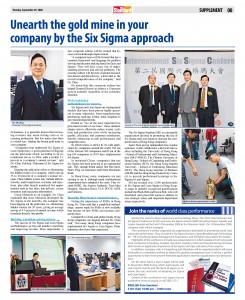In business, it is generally known that increasing revenues may mean cutting costs or increasing production. But few notice that there is a third way: f inding the buried gold mine in your company.
“Companies that implement Six Sigma or Lean Sigma have a great potential of digging out the gold mine which, according to an international survey in 2006, adds a sizable 2.3 percent to a company’s annual revenue,” said Dr. Chan Yuk-kau, Chairman of Six Sigma Institute.
Digging the gold mine refers to eliminating the hidden wastes of a company, which eats up 25 to 40 percent of a company’s annual revenue. These hidden wastes may include defects, reworks, audit inspections, warranty and rejections, plus other largely unnoticed lost opportunities such as lost sales, late delivery, excess inventory and inaccurate information.
Using Motorola as an example, Dr. Chan explained that since Motorola developed the Six Sigma in the mid 80s, the company has been digging out the gold mine (i.e. eliminating hidden wastes) for 20 years, giving an average saving of 4.5 percent of annual revenue which translates directly into profits.
Building a problem-solving culture
The success of Six Sigma and Lean Sigma methodologies go beyond number crunching and improving revenue. More importantly, a new corporate culture will be created that focuses on breakthrough improvement.
“A competent team will be formed that has a common framework and language for problem solving and decision making based on facts and figures. They will have a new way of understanding processes and solving problems. The existing culture will become customer-focused, fact-based and data-driven, which add to the overall competitiveness of the company,” said Dr. Chan.
He noted that this corporate culture has helped General Electric to achieve a 20 percent growth annually regardless of the economic situation.
Well established methodologies for success
Six Sigma and Lean Sigma are management models that have been proven highly practical in many industries, from manufacturing, purchasing, banking, airline, hotel, hospitals to government departments.
Hailed as “two of the most important improvement trends of our time”, these methodologies aim to effectively reduce wastes, cycle time and production costs while increasing quality, efficiency and customer satisfaction, thereby enhancing overall performance and competitiveness.
Its effectiveness is shown by its wide application by companies around the world: 266 out of the Fortune 500 companies and 82 out of the top 100 companies in 2005 have implemented Six Sigma.
In mainland China, companies that use Six Sigma has been growing at an exponential rate. They include brand names like Boa Steel, Haier, Ping An Insurance and China Merchants Bank. In Hong Kong, many companies are just starting to use it, although many multinational corporations have adopted it for years. They include HSBC, the Airport Authority, Tuen Mun Hospital, Sheraton Hotel, CLP, PCCW, MTR and Siemens.
Boosting Hong Kong’s competitiveness
Noting the importance of SMEs in Hong Kong, Dr. Chan said that a simplified methodology custom made for SMEs is now available that focuses on how SMEs can increase competitiveness.
Compared to China and global trends, Hong Kong companies are lagging behind. Dr. Chan said: “Not many Hong Kong companies have implemented Six Sigma or Lean Sigma. Many industries don’t have that experience.”
The Six Sigma Institute (SSI) is a non-profit organization devoted to promoting the use of Six Sigma and Lean Sigma to increase the competitiveness of Hong Kong companies.
Apart from giving independent free regular seminars, it also collaborates with local universities including the University of Hong Kong – School of Professional and Continuing Education (HKU SPACE), The Chinese University of Hong Kong – School of Continuing and Professional Studies (SCS), the Hong Kong Baptist University – School of Continuing Education (SCE), The Hong Kong Institute of Bankers (HKIB) and the Hong Kong Productivity Council, to provide professional trainings in Six Sigma or Lean Sigma.
SSI has trained over 2,000 professionals in Six Sigma and Lean Sigma in Hong Kong. A range of globally recognized qualifications include the Black Belt and Green Belt, who will lead black and green belt teams to address to core strategic issues and important department issues respectively.
The original copy:











